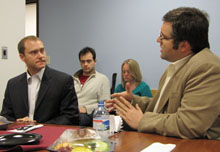Event
Google’s Greenberger presents efficiency of online campaigning

April 6, 2010 — Peter D. Greenberger started the first political advertising team at Google, Inc., and at a visit to the Shorenstein Center, he explained why and how Google has gotten involved in the political realm.
Greenberger, currently Google’s head of industry relations, outlined several reasons for Google’s political involvement in the last three years. First, he said, it fits with Google’s broader corporate mission: “to organize the world’s information and to make it universally accessible and useful to everyone everywhere at all times.” It is a “democratizing platform,” as online campaigning allows both large and small advertisers to compete in the same space. Also motivating is the revenue that Google is able to bring in with online campaign advertising.
With such incentives to expand political campaigns, Google has implemented digital technology in every phase of the campaign process, Greenberger said. Google Enterprise Solutions, such as Google Docs, Spreadsheets and Calendars, are ideal for campaigns because of their collaborative nature. Nicco Mele, HKS lecturer in public policy, added that Google applications eliminate the need for software licensing that small campaigns often can’t afford.
Search advertising — placing ads on search results pages — helps with “building your list,” which Greenberger explained is “toward the top of efficient ways to collect names.” Online advertising also helps with fundraising, and provides a “great return on investment.” Greenberger sees an “evolution from direct response to persuasion” in the online advertising world, and it presents a great opportunity to reach users at the crucial moment that they enter search criteria.
Finally, Greenberger explained how Google helps with a campaign’s mobilization through what is called a “network blast” or “Google surge,” which means “flooding the zone with millions of impressions of display ads in a very short period of time in a localized region.” To do this, the Google Content Network matches online ads with the content on each web page being viewed and the demographic of the user.
The role of the Internet continues to increase with every campaign, from Barack Obama to Bob McDonnell to Scott Brown, and Greenberger said Google’s goal is “10 in ’10”: By 2010, 10 percent of campaign dollars will be allocated to online advertising. Greenberger is encouraged by the growing trends, and sees online campaigns moving from “margins to mainstream.”
This article was written by Janell Sims and the photos taken by Heather McKinnon, both of the Shorenstein Center.